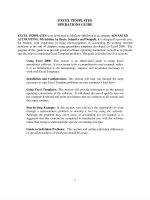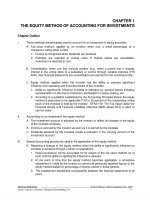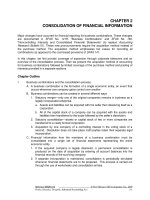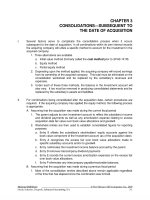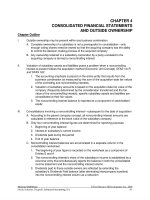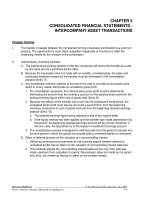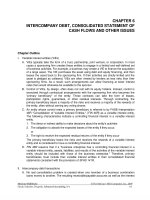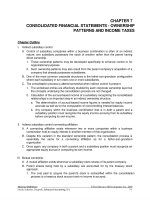Solution manual advanced accounting 2nd by hamlen CH02
Bạn đang xem bản rút gọn của tài liệu. Xem và tải ngay bản đầy đủ của tài liệu tại đây (815.01 KB, 24 trang )
Find more at www.downloadslide.com
CHAPTER 2
SOLUTIONS TO MULTIPLE CHOICE QUESTIONS, EXERCISES AND PROBLEMS
MULTIPLE CHOICE QUESTIONS
1.
b
Only the advanced production technology and customer lists intangibles meet the
contractual or separability criteria.
2.
c
$40,000 - $400 = $39,600.
3.
b
Outside consultants costs are expensed.
4.
a
This is a post-acquisition event, and does not adjust the date-of-acquisition value of the
equipment. The reduction in value is a loss, reported on the income statement.
5.
c
This change in value occurs in the measurement period, and corrects the original
acquisition entry. The correction is:
Goodwill
2,000
Identifiable intangible assets
6.
2,000
c
$60,000 – ($4,200 + $6,000 + $14,000 + $4,000 + $1,000 - $2,000 - $11,600) = $44,400.
7.
b
$8,000 – ($4,200 + $6,000 + $14,000 + $500 - $2,000 - $11,600) = $(3,100).
8.
d
Favorable location does not meet the contractual or separable criteria.
Solutions Manual, Chapter 2
©Cambridge Business Publishers, 2013
1
Find more at www.downloadslide.com
9.
d
The Codification requires capitalization of acquired in-process R&D regardless of its
alternative future use or probability of success.
10.
a
Warranty liabilities are known liabilities, and are likely to be estimable within the
measurement period. The others are “other contingencies” and less likely to have
measurable fair values at the date of acquisition.
©Cambridge Business Publishers, 2013
2
Advanced Accounting, 2nd Edition
Find more at www.downloadslide.com
EXERCISES
E2.1
Recording a Merger and a Stock Acquisition
a.
Cash and receivables
Equity method investments
Inventory
Plant assets
Goodwill
Merger expenses
120,000
200,000
400,000
1,000,000
3,720,000
175,000
Current liabilities
Long-term debt
Cash
340,000
1,100,000
4,175,000
b.
Investment in Slys
Merger expenses
4,000,000
175,000
Cash
4,175,000
E2.2
Post-Combination Balance Sheet: Three Types of Combinations
a.
Allen makes the entries shown below in cases (1), (2) and (3), respectively:
(1)
Cash
Other current assets
Property, plant and equipment
Goodwill
50,000
150,000
400,000
50,000
Current liabilities
Long-term liabilities
Cash
100,000
250,000
300,000
(2)
Investment in Benson
300,000
Cash
300,000
(3)
Other current assets
Property, plant and equipment
Goodwill
150,000
400,000
50,000
Current liabilities
Long-term liabilities
Cash
Solutions Manual, Chapter 2
100,000
250,000
250,000
©Cambridge Business Publishers, 2013
3
Find more at www.downloadslide.com
E2.2
continued
a.
continued
Allen’s post-acquisition balance sheet for each case is as follows:
Allen Corp.
Post-combination Balance Sheet
Case (1)
Case (2)
Cash
$ 150,000
$ 100,000
Other current assets
750,000
600,000
Property plant and equipment
1,600,000
1,200,000
Investment in Benson
-300,000
Goodwill
50,000
--____
$2,550,000
$2,200,000
Current liabilities
$ 400,000
$ 300,000
Long-term liabilities
850,000
600,000
Common stock
200,000
200,000
Additional paid-in capital
300,000
300,000
Retained earnings
800,000
800,000
$2,550,000
$2,200,000
b.
Case (3)
$ 150,000
750,000
1,600,000
-50,000
$2,550,000
$ 400,000
850,000
200,000
300,000
800,000
$2,550,000
In the stock acquisition case, total assets are unchanged from Allen's pre-combination
balance sheet, reflecting the payment of $300,000 cash and the acquisition of a $300,000
stock investment. In the merger and asset acquisition cases, total assets increase by
$350,000. Cash of $300,000 was paid to acquire assets recorded at $650,000 (including
$50,000 of goodwill). Note that $350,000 in liabilities were also recorded, so that there
was no change in Allen's net assets.
c.
Cash
Benson Corp.
Post-Acquisition Balance Sheet
$300,000 Common Stock
Additional Paid-in Capital
_______ Retained Earnings
$300,000
$100,000
50,000
150,000
$300,000
Benson's only asset is $300,000 cash, consisting of its $50,000 prior balance plus
$250,000 received from Allen in exchange for all its previous noncash assets and
liabilities. The noncash assets and liabilities sold had a net book value of $200,000. The
$50,000 gain on the sale is reflected in retained earnings.
©Cambridge Business Publishers, 2013
4
Advanced Accounting, 2nd Edition
Find more at www.downloadslide.com
E2.3
Recording an Acquisition
(in millions)
Cash and cash equivalents
Accounts receivable, net
Other assets
Property, plant and equipment
Customer relationships
Technology
Non-compete agreements
Tradenames
Merger expenses
Goodwill
266
410
58
323
1,081
44
39
10
116
2,327
Deferred tax liability, net
Other liabilities
Cash
E2.4
424
256
3,994
Bargain Purchase
a.
Price paid
Fair value of identifiable net assets:
Marketable securities
Land
Buildings
Equipment
Identifiable intangibles
Other net assets
Gain on acquisition
$ 3,000,000
$ 100,000
800,000
500,000
300,000
1,300,000
200,000
$
3,200,000
200,000
b.
Marketable securities
Land
Buildings
Equipment
Identifiable intangibles
Other net assets
100,000
800,000
500,000
300,000
1,300,000
200,000
Cash
Gain on acquisition
Solutions Manual, Chapter 2
3,000,000
200,000
©Cambridge Business Publishers, 2013
5
Find more at www.downloadslide.com
E2.5
Goodwill and Bargain Purchase
(amounts in thousands)
Current assets
Plant assets
Identifiable intangibles
Goodwill
Liabilities
Cash
Gain on acquisition
Case 1
300
600
700
200
800
1,000
--
Case 2
400
800
300
--
Case 3
50
1,430
200
-500
300
1,000
1,000
-380
E2.6
Changes in Acquisition Values
a.
The value changes occurred during the measurement period. We know this because
goodwill is adjusted, implying that the initial acquisition entry has been corrected.
b.
Identifiable intangible assets
Goodwill
Earnings contingency liability
6
34
5
Inventories
Plant and equipment, net
Long-term liabilities
E2.7
5
30
10
Acquisition Cost
Tangible assets
Intangible assets
Goodwill
Merger expenses
25,000,000
90,000,000
100,000,000
900,000
Liabilities
Cash
Common stock
Additional paid-in capital
©Cambridge Business Publishers, 2013
6
55,000,000
101,650,000
1,500,000
57,750,000
Advanced Accounting, 2nd Edition
Find more at www.downloadslide.com
E2.8
Identification of Reportable Intangibles
a.
Identifiable intangibles are to be recorded in a business combination. Identifiable
intangibles include those arising from contractual and other legal rights and those which
are separable.
Of the eight intangibles listed, four appear to be based on contractual and other legal
rights:
Signed customer contracts
Internet domain name
Office leases
Registered company name and trademark
$1,000,000
150,000
100,000
60,000
One additional item appears to be separable, capable of being sold, licensed, or otherwise
transferred:
Proprietary databases of industry data
$
50,000
The remaining three items appear to neither be based on contractual/legal rights nor
separable.
b.
Price paid
Fair value of identifiable net assets:
Tangible net assets
Signed customer contracts
Internet domain name
Office leases
Registered company name and trademark
Proprietary databases
Goodwill
Solutions Manual, Chapter 2
$ 2,400,000
$
400,000
1,000,000
150,000
100,000
60,000
50,000
1,760,000
$ 640,000
©Cambridge Business Publishers, 2013
7
Find more at www.downloadslide.com
E2.9
Preacquisition Contingency
Original acquisition entry:
Current assets
Noncurrent assets
Goodwill
850,000
1,600,000
130,000
Estimated liability-lawsuits
Other liabilities
Cash
280,000
500,000
1,800,000
The reduction in the estimated liability from $280,000 to $200,000 is the result of new
information on liability value as of the acquisition date, so the reduction is treated as a correction
of the original acquisition entry, within the measurement period.
Change in pre-acquisition liability within measurement period:
Estimated liability-lawsuits
Goodwill
80,000
80,000
Changes in the estimated liability due to new information and events occurring after the
acquisition date are reported in income.
Change in pre-acquisition liability after measurement period:
Loss on contingent liability
Estimated liability-lawsuits
150,000
150,000
E2.10 Contingent Consideration
a.
The expected present value of the earnings contingency is calculated as follows:
Value of stock issued
$200,000
400,000
500,000
x
x
x
x
Probability
0.25
0.40
0.35
=
=
=
=
Expected value
$ 50,000
160,000
175,000
$ 385,000
$385,000/(1.10)2 = $318,000 (rounded to nearest thousand)
The expected present value of the stock price contingency is calculated as follows:
Value of stock issued
x Probability = Expected value
$10,000,000 – 6,000,000 = $4,000,000 x 0.10
= $ 400,000
$10,000,000 – 9,000,000 = $1,000,000 x 0.20
=
200,000
$ 600,000
$600,000/(1.10)2 = $496,000 (rounded to nearest thousand)
©Cambridge Business Publishers, 2013
8
Advanced Accounting, 2nd Edition
Find more at www.downloadslide.com
E2.10 continued
a.
continued
Plank reports the initial acquisition as follows:
Current assets
Property, plant and equipment
Intangibles
Goodwill
2,000,000
12,000,000
3,000,000
6,814,000
Liabilities
Contingent consideration
liability
Common stock (par $1)
Additional paid-in capital
Additional paid-in capital –
contingent consideration
Cash
b.
8,000,000
318,000
250,000
9,750,000
496,000
5,000,000
(1) If the value change occurs within the measurement period, the acquisition entry is
adjusted:
Goodwill
100,000
Contingent consideration liability
100,000
(2) If the value change occurs after the measurement period (and is therefore due to
events subsequent to the acquisition), the value change is reported in earnings:
Loss on earnout
100,000
Contingent consideration liability
Solutions Manual, Chapter 2
100,000
©Cambridge Business Publishers, 2013
9
Find more at www.downloadslide.com
E2.11 In-Process R&D, Other Previously Unreported Intangibles, Goodwill
The in-process R&D and patent rights meet Codification requirements for capitalization. The
contracts under negotiation with potential customers and the skilled workforce do not meet the
contractual or separability criteria, so these assets are reported as part of goodwill.
The acquisition entry is as follows:
Current assets
Plant assets
In-process R&D
Patent rights
Goodwill
500,000
700,000
2,500,000
3,000,000
23,750,000
Liabilities
Common stock (par $0.50)
Additional paid-in capital
450,000
1,000,000
29,000,000
E2.12 Valuation of Earnings Contingency
The expected payment is computed as follows:
(6,500,000 – 5,500,000) x $0.50 x 0.25 =
(7,500,000 – 5,500,000) x $0.50 x 0.20 =
$ 125,000
200,000
$ 325,000
The payment takes place at the end of the year, so the present value is:
$325,000/(1.06) = $306,604
©Cambridge Business Publishers, 2013
10
Advanced Accounting, 2nd Edition
Find more at www.downloadslide.com
PROBLEMS
P2.1
Acquisition Entries, Various Types of Combinations, Acquisition Costs
a.
Books of Plastic Corporation
Cash and receivables
Inventory
Equity method investments
Land
Buildings and equipment
Patents
Goodwill
Merger expenses
35,000
45,000
20,000
11,000
14,000
10,000
12,000
25,000
Liabilities
Cash
b.
22,000
150,000
Assume all fair value estimates have been reassessed and are considered accurate. The
journal entry made by Plastic to record the merger appears below.
Books of Plastic Corporation
Cash and receivables
Inventory
Equity method investments
Land
Buildings and equipment
Patents
Merger expenses
35,000
45,000
20,000
11,000
14,000
10,000
10,000
Liabilities
Cash
Gain on acquisition
c.
22,000
110,000
13,000
Books of Plastic Corporation
Investment in Steel
Merger expenses
135,000
15,000
Cash
Solutions Manual, Chapter 2
150,000
©Cambridge Business Publishers, 2013
11
Find more at www.downloadslide.com
P2.2
Identification of Acquirer and Balance Sheet Valuation
a.
(1)
Current assets
Property, plant and equipment
Identifiable intangibles
(2)
Current assets
Property, plant and equipment
Identifiable intangibles
b.
$100,000
250,000
80,000
90,000
$520,000
Barcel Inc.
Balance Sheet
October 4, 2013
$150,000 Current liabilities
550,000 Long-term debt
75,000 Common stock
_______ Retained earnings
$775,000
$100,000
505,000
60,000
110,000
$775,000
Fair values are recorded only for the acquired company; net assets of the acquiring
company remain at book value. A reconciliation is provided below.
Book value of Axtel’s assets
Book value of Barcel’s assets
Fair value adjustments recorded for:
Axtel’s assets
Barcel’s assets
Post-combination recorded assets
c.
Axtel Inc.
Balance Sheet
October 4, 2013
$ 65,000 Current liabilities
375,000 Long-term debt
80,000 Common stock
_______ Retained earnings
$520,000
Case (1)
$240,000
200,000
Case (2)
$240,000
200,000
–
80,000
$520,000
335,000
–
$775,000
In this situation, it is likely that Coppel is being formed by the combining parties. One of
the combining entities must be designated the acquiring company. Both Axtel and Barcel
are of equal size in terms of book value of stockholders= equity. Axtel is larger in terms
of fair value of net assets. Axtel stockholders also receive the majority interest (60%) in
the new company. Thus, Axtel would likely be designated the acquiring company.
Current assets
Property, plant and equipment
Identifiable intangibles
©Cambridge Business Publishers, 2013
12
Coppel, Inc.
Balance Sheet
October 4, 2013
$ 65,000 Current liabilities
375,000 Common stock
80,000 Retained earnings
$520,000
$100,000
330,000
90,000
$520,000
Advanced Accounting, 2nd Edition
Find more at www.downloadslide.com
P2.3
Acquisition Adjustments and Merger Costs
(all amounts in thousands)
a.
The goodwill balance on GameStop’s balance sheet represents the sum of reported
goodwill on all its acquisitions. GameStop apparently made prior acquisitions where the
acquisition price exceeded the fair values of acquired identifiable net assets.
b.
Balance at February 3, 2007
Reduction in goodwill by revision of accrued
merger-related liabilities
Additional purchase price adjustments
Goodwill at February 2, 2008
c.
$ 1,403,907
(406)
(1,061)
$ 1,402,440
Adjustments to the original amount of goodwill recorded must occur within the
measurement period, and relate to clarifications of the fair values of identifiable assets
and liabilities acquired, preacquisition contingencies, earnout or stock price contingency
values included as part of the acquisition price, as of the date of acquisition.
If the purchase price adjustments reduce goodwill, this implies that the revisions in value
either increased the reported fair values of identifiable assets or preacquisition
contingencies reported as assets, or reduced identifiable liabilities, earnouts, stock price
contingencies, or preacquisition contingencies reported as liabilities.
d.
Prior to 2009, merger-related costs, such as legal or consulting fees, were reported as a
part of the acquisition cost, increasing goodwill. Under current GAAP, these costs are
expensed as incurred and do not impact the value of assets and liabilities acquired.
According to the GameStop disclosure, $612 in merger-related liabilities were accrued,
increasing goodwill. As of February 2, 2008, the actual payments for merger-related
costs were only $206, so the estimated costs were $406 too high and therefore goodwill
was adjusted downward by that amount.
Following current requirements, the $206 in merger-related costs that remain as part of
the current goodwill balance would not be reported as goodwill but would instead be
treated as expenses. Therefore goodwill at February 2, 2008 would be $1,402,234 (=
$1,402,440 – 206).
Solutions Manual, Chapter 2
©Cambridge Business Publishers, 2013
13
Find more at www.downloadslide.com
P2.4
Type of Business Combination, Identification of Acquiring Company
a.
Corporate History:
11/96: Babbage’s is formed.
10/99: Babbage’s acquired by, and becomes wholly-owned subsidiary of, Barnes &
Noble.
6/00: Barnes & Noble acquires Funco, Inc.; Babbage’s becomes a wholly-owned
subsidiary of Funco.
12/00: Funco changes its name to GameStop, Inc.
8/01: The original GameStop Corp. (now referred to as “Historical GameStop”) is
incorporated as a holding company for GameStop, Inc.
2/02: Historical GameStop issues 41,528,000 shares in a public offering. Barnes &
Noble receives 72,018,000 shares for its ownership of GameStop, Inc.
10/04: Historical GameStop repurchases and retires 12,214,000 shares from Barnes &
Noble. Barnes & Noble distributes its remaining 59,804,000 shares to its
shareholders as a dividend. GameStop Holdings Corp. is formed, and all stock is
converted to stock of that company.
4/05: GSC Holdings Corp. is formed for the purpose of completing the business
combination of GameStop Holdings Corp. (formerly GameStop Corp. or
“Historical GameStop”) and Electronics Boutique Holdings Corp.
10/05: The above merger is completed. GSC Holdings Corp. changes its name to
GameStop Corp.
b.
This combination was a statutory consolidation. GSC Holdings Corp. was formed to
acquire GameStop Holdings Corp. and Electronics Boutique Holdings Corp.
c.
GameStop Holdings’ stockholders had the larger voting interest in the combined
company – they received 104,135,000 shares compared to 40,458,000 shares for the
former Electronics Boutique stockholders. There is not enough information to assess the
other criteria.
d.
The acquisition price of Electronics Boutique was $1,430,398,000. This may be
determined as the total consideration paid of $1,443,956,000 minus the transactions costs
(merger expenses) of $13,558,000, or as the value of the stock given to EB stockholders
$437,144,000 plus the cash paid for EB stock and stock options $993,254,000.
©Cambridge Business Publishers, 2013
14
Advanced Accounting, 2nd Edition
Find more at www.downloadslide.com
P2.5
Identifiable Intangibles and Goodwill
a.
Acquisition cost (1,000,000 shares @ $35)
Identifiable net assets acquired:
Cash
Accounts receivable
Parts inventory
Equipment
Intangible: Lease
Intangible: Service contracts
Intangible: Trade name
Current liabilities
Long-term liabilities
Goodwill
$35,000,000
$ 300,000
2,600,000
6,000,000
19,500,000
1,250,000
2,000,000
200,000
(3,100,000)
(8,000,000)
20,750,000
$14,250,000
Note: The lease, service contracts, and trade name qualify as identifiable intangibles, as
they are based on legal or contractual rights. The work force does not qualify as an
identifiable intangible, as it is neither separable nor based on legal/contractual rights.
Thus the work force value is included as part of goodwill.
b.
Prince’s journal entry to record the merger is as follows:
Cash
Accounts receivable
Parts inventory
Equipment
Intangible: Lease
Intangible: Service contracts
Intangible: Trade name
Goodwill
Merger expenses
Cash (1)
Current liabilities
Long-term liabilities
Capital stock (2)
300,000
2,600,000
6,000,000
19,500,000
1,250,000
2,000,000
200,000
14,250,000
1,200,000
1,800,000
3,100,000
8,000,000
34,400,000
Notes:
(1) Cash paid for professional fees ($1,200,000) and registration and issue costs
($600,000).
(2) Proceeds from stock issue ($35,000,000) less registration and issue costs ($600,000).
No par value is specified, so it is not possible to distinguish common stock at par
value from additional paid-in capital.
Solutions Manual, Chapter 2
©Cambridge Business Publishers, 2013
15
Find more at www.downloadslide.com
P2.6
Goodwill
a.
The following business factors or conditions might give rise to goodwill:
b.
c.
Well-trained, motivated, and cooperative employees, and superior management.
Product-related factors such as reputed high quality.
Exclusive processes or formulas.
Loyal customer base.
Favorable or unusual location, and good distribution channels.
(amounts in millions)
Cost of Toga Corporation to Lisa Corporation
Fair market value of the identifiable assets and liabilities:
Accounts receivable
Inventories
Long-term marketable debt securities
Property, plant and equipment
Total assets
Less: Current liabilities
Total fair market value of identifiable net assets
Goodwill
$ 780
$
40
135
115
410
700
(70)
630
$ 150
Goodwill is recorded as an asset only when acquired from another enterprise, i.e., Lisa
Corporation's purchase of Toga Corporation. The goodwill was not included on Toga
Corporation's balance sheet since the cost of developing, maintaining, or restoring
intangible assets that are not specifically identifiable was expensed as incurred by Toga
Corporation.
©Cambridge Business Publishers, 2013
16
Advanced Accounting, 2nd Edition
Find more at www.downloadslide.com
P2.7
Bargain Purchase and Preacquisition Contingency
a.
The entry below assumes the fair values of net identifiable assets acquired are accurate.
Cash and receivables
Inventory
Depreciable plant assets
Other assets
6,400,000
5,800,000
6,500,000
3,000,000
Current liabilities
Estimated lawsuit liability
Long-term debt
Capital stock
Gain on acquisition
b.
5,000,000
800,000
1,800,000
10,000,000
4,100,000
The $500,000 decline in the value of the lawsuit is a clarification of value as of the date
of acquisition and is within one year of the acquisition date. Therefore the value change
occurs within the measurement period, and the original acquisition entry is adjusted, as
follows:
Estimated lawsuit liability
500,000
Gain on acquisition
c.
500,000
The $100,000 increase in the value of the lawsuit is reported as a loss, and is not a
correction in the original acquisition entry. The entry to record settlement of the lawsuit
is as follows:
Estimated lawsuit liability
Loss on lawsuit
300,000
100,000
Cash
Solutions Manual, Chapter 2
400,000
©Cambridge Business Publishers, 2013
17
Find more at www.downloadslide.com
P2.8
Post-Combination Balance Sheet, Goodwill
(all amounts in millions)
Softdata makes the following entry to record the acquisition:
Current assets
Property, plant and equipment
Patents and trademarks
Brand names
Software
Goodwill
Merger expenses
18
600
250
10
50
69
2
Current liabilities
Long-term liabilities
Common stock
Additional paid-in capital
Cash
15
900
0.5
68.5
15
Softdata’s post-acquisition balance sheet is as follows:
Current assets ($100 – 12 – 1 – 2 + 18)
Property, plant and equipment
Patents and trademarks
Brand names
Software
Goodwill
Total assets
©Cambridge Business Publishers, 2013
18
$
103
2,600
750
10
50
___69
$ 3,582
Current liabilities
Long-term liabilities
Common stock
Additional paid-in capital
Retained earnings ($245 – 2)
Treasury stock
Total liabilities and equity
$
215
2,400
10.5
718.5
243
___(5)
$ 3,582
Advanced Accounting, 2nd Edition
Find more at www.downloadslide.com
P2.9
Merger Entry, Valuation Adjustments
(all amounts in millions)
a.
Price paid
Fair value of identifiable net assets
Goodwill
$ 37,738
22,267
$ 15,471
b.
The following discussion appears in Sprint Nextel’s 2005 10-K:
We paid a premium (i.e., goodwill) over the fair value of the net tangible and identified
intangible assets of Nextel for a number of potential strategic and financial benefits that
are expected to be realized as a result of the merger, including, but not limited to, the
following:
c.
the combination of extensive network and spectrum assets, which enables us to offer
consumers, businesses and government agencies a wide array of broadband wireless
and integrated communications services;
the combination of Nextel’s strength in business and government wireless services
with our position in consumer wireless and data services, including services
supported by our global IP network, which enables us to serve a broader customer
base;
the size and scale of the combined company, which is comparable to that of our two
largest competitors, is expected to enable more operating efficiencies than either
company could achieve on its own; and,
the ability to position us strategically in the fastest growing areas of the
communications industry.
Because this acquisition took place prior to the current standards, Sprint used the
announcement date share price to value the stock issued to Nextel’s former shareholders.
Currently, stock issued for acquisitions is valued at the share price when control changes
hands, typically when the acquisition is completed. One might argue that the
announcement date stock price represents the intended acquisition cost. However, the
stock price at the date of acquisition better represents actual acquisition cost. The
difference between these two prices may not be an issue, however, if the acquiring
company adjusts the amount of stock issued for changes in stock price between the
announcement date and the acquisition date.
Solutions Manual, Chapter 2
©Cambridge Business Publishers, 2013
19
Find more at www.downloadslide.com
P2.9
continued
d.
Current assets
Property, plant and equipment
Spectrum licenses and other
indefinite life intangibles
Customer lists and other
definite life intangibles
Investments
Other assets
SE – deferred compensation (1)
Goodwill
Merger expenses
5,501
8,454
14,640
10,448
2,680
111
518
15,471
78
Current liabilities
Long-term debt
Other long-term liabilities
Common stock
APIC – new stock issued
APIC – stock options
Cash
2,902
8,984
8,199
2,828
32,817
1,124
1,047
e.
Current assets
Other long-term liabilities
Goodwill
4
105
24
Property, plant and equipment
Investments
Current liabilities
Shareholders’ equity –
deferred compensation (1)
80
2
18
33
(1) Sprint’s disclosure does not identify the specific equity account affected by the
deferred compensation. It is likely that Sprint recorded the liability but the related
expense does not yet appear on the income statement; in that case the original debit
and the subsequent credit adjustment may be to accumulated other comprehensive
income.
©Cambridge Business Publishers, 2013
20
Advanced Accounting, 2nd Edition
Find more at www.downloadslide.com
P2.10 Earnings Contingency, In-Process R&D, Bargain Purchase
(all amounts in thousands)
a.
($60,000 – $50,000) x 2 =
($80,000 – $50,000) x 2 =
$20,000 x.08
$60,000 x .02
=
=
$2,800/(1.05)2 =
b.
Price paid:
Cash
Earnout
Total price
Fair value of reported assets:
Fair value of reported liabilities:
Fair value of unreported IPR&D
Gain on acquisition
$1,600
1,200
$2,800
$2,540
$1,250,000
2,540
$1,252,540
$8,200,000
(7,850,000)
(350,000)
(1,000,000)
$ 97,460
c.
Current assets
Property, plant and equipment
Patents
In-process R&D
200,000
5,000,000
3,000,000
1,000,000
Liabilities
Cash
Contingent consideration
liability
Gain on acquisition
7,850,000
1,250,000
2,540
97,460
d.
Current assets
Property, plant and equipment
Patents
In-process research &
development
Total assets
Solutions Manual, Chapter 2
$ 3,950,000 Liabilities
65,000,000 Capital stock
13,000,000 Retained earnings
$42,852,540
25,000,000
15,097,460
1,000,000
$82,950,000 Total liabilities and equity
_________
$82,950,000
©Cambridge Business Publishers, 2013
21
Find more at www.downloadslide.com
P2.11 Bargain Gain, Contingent Consideration, and Changes in Estimates
(in thousands)
a.
Inventory
Machinery and equipment
Land and buildings
Accounts receivable
Prepaid expenses
Trade names and trademarks
Unpatented technology
Merger expenses
1,841
1,716
2,610
464
5
420
670
54
Accounts payable
Accrued expenses
Deferred tax liability
Cash
Common stock
Notes payable
Contingent consideration
liability
Gain on acquisition
144
150
1,557
154
250
2,580
30
2,915
b.
Gain on acquisition
Goodwill
2,915
257
Inventory
Machinery and equipment
Land and buildings
Contingent consideration
liability
841
916
1,410
5
c.
Loss
3,172
Inventory
Machinery and equipment
Land and buildings
Contingent consideration
liability
d.
841
916
1,410
The entry would be the same, except the contingency consideration fair value would not
be adjusted; the loss would be $3,167.
©Cambridge Business Publishers, 2013
22
Advanced Accounting, 2nd Edition
5
Find more at www.downloadslide.com
P2.12 Multiple Asset Acquisitions, Analysis of Combination Terms
a.
b.
Reconciliation of shares issued, as per balance sheet:
Shares issued as of March 31, 2008
Shares issued as of June 30, 2007
Increase in shares
49,509,829
15,764,842
33,744,987
Shares issued to Alternative Energy
Shares issued to Boreal for wind project assets
Shares issued to Boreal for Navitas stock
Shares issued for cash
Shares issued to executives
Total shares issued
4,000,000
18,500,000
10,000,000
1,159,987
85,000
33,744,987
Dollar amount assigned to shares issued:
(1)
Per analysis of asset accounts:
Increase in wind farm assets
Increase in wind projects assets
Increase in Navitas stock
Increase in goodwill
Less: acquisitions for cash
Calculated value of shares issued
(2)
$ 3,150,000
13,096,175
11,287,250
1,387,750
(851,175)
$28,070,000
Per analysis of equity accounts:
Increase in common stock account
Increase in additional paid-in capital account
Less: cash received for issued shares
Less: value assigned to shares issued to executives
Calculated value of shares issued
$ 1,687,249
27,374,667
(945,416)
(76,500)
$28,040,000
Note to instructor: There are slight unexplained differences between these two calculated
values and the value disclosed on the company’s cash flow statement.
Solutions Manual, Chapter 2
©Cambridge Business Publishers, 2013
23
Find more at www.downloadslide.com
P2.12 continued
c.
Per share valuations for each acquisition:
Wind farms from Northern Alternative Energy, $3,150,000, divided by 4,000,000
shares, equals $.7875 per share
Wind projects from Boreal, $13,632,750 ($13,096,175 increase in wind project assets,
less $851,175 acquired for cash, plus $1,387,750 goodwill), divided by 18,500,000
shares, equals $.7369 per share
Navitas stock acquired from Boreal, $11,287,250, divided by 10,000,000 shares,
equals $1.1287 per share
The first two were valued below the market value of the shares when the acquisition
occurred, and the third may have been as well. A reason for this is that the issuance of a
large number of shares relative to the number already outstanding likely would have
depressed the prevailing market price. Note that the shares sold for cash averaged $.8150
per share.
d.
The company’s MD&A disclosed the following:
Our valuation of Boreal assets was based on a number of tangible and intangible factors
including the book value of certain assets on Boreal’s audited balance sheet, the
development status of certain wind farms now underway, the extensive Boreal pipeline of
future prospects, recent industry transactions reflecting value creation payments for
completed wind farms and early stage pipeline prospects, anticipated price/earnings
ratios from comparisons to peer group public companies, and other considerations of the
Board of Directors of the Company.
e.
The acquired assets need to be carefully estimated in terms of their fair values, including
previously unreported identifiable intangibles. Assuming this is a business combination
subject to ASC Topic 805 requirements, if the cost (the recorded amount of Navitas stock)
exceeds the fair value of the identifiable net assets acquired, goodwill will be recorded.
If the fair value of net identifiable assets acquired exceeds the cost, a gain on acquisition
will be recorded.
©Cambridge Business Publishers, 2013
24
Advanced Accounting, 2nd Edition


